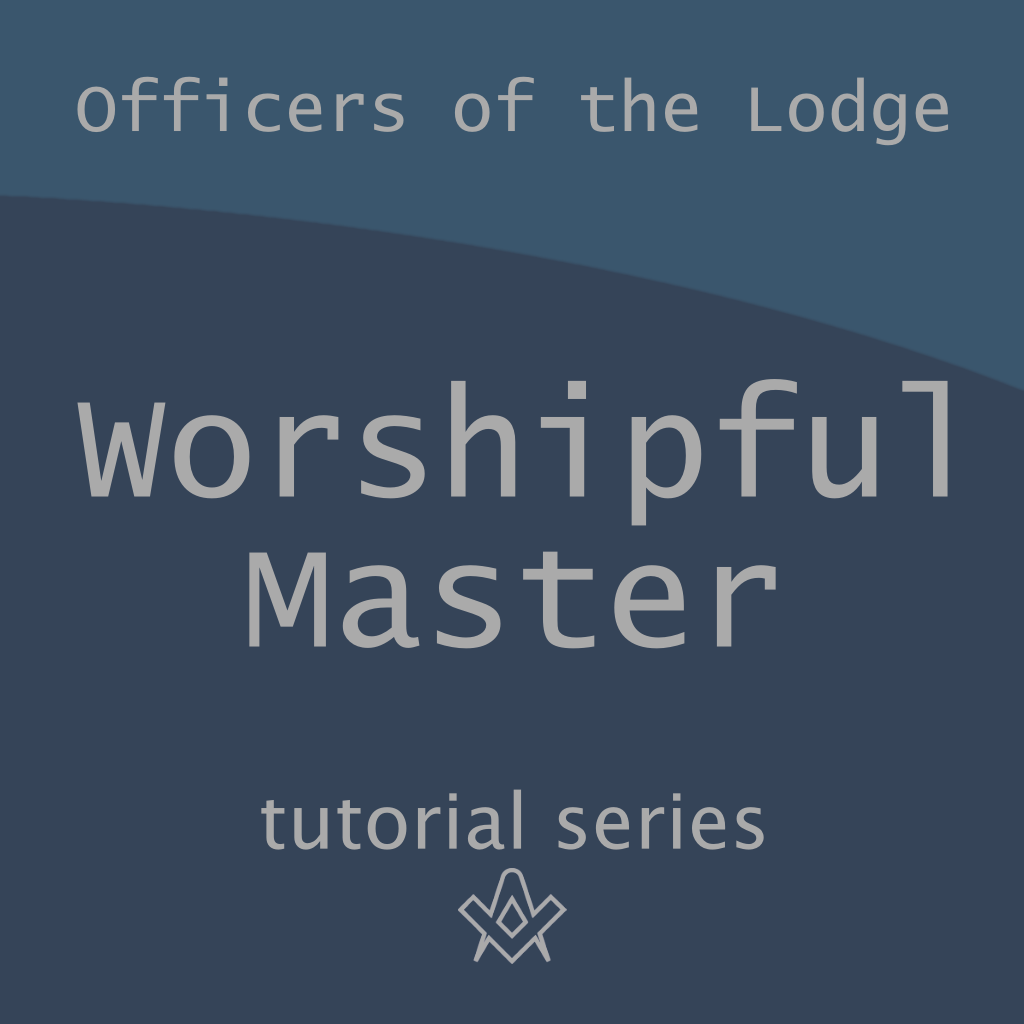Who is the Worshipful Master being placed in the east? Your spirit, the quality of your purpose in life.
This is number 6 of a 6 part tutorial series on the Officers of the Lodge
Each part published monthly in The Square
Lodge Officers: The Tyler, Inner Guard, Deacons, Junior Warden, Senior Warden, Worshipful Master
The Worshipful Master – Your Spirit
Your spirit is the quality of your purpose in life. It is your experience, your wisdom and your self will that drives you from the moment you start your day.
Where do you find a Freemason’s Spirit emanating? At the Worshipful Master’s pedestal we find those “Three Great Lights” of Freemasonry, the VSL, the S and the Cs.
It is here where you will find a Freemason’s spirit, whatever their faith.
“The Sacred Writings are to govern your faith, the Square to regulate your actions and the Compasses to keep you in due bounds with all mankind, particularly your Brethren in Freemasonry”
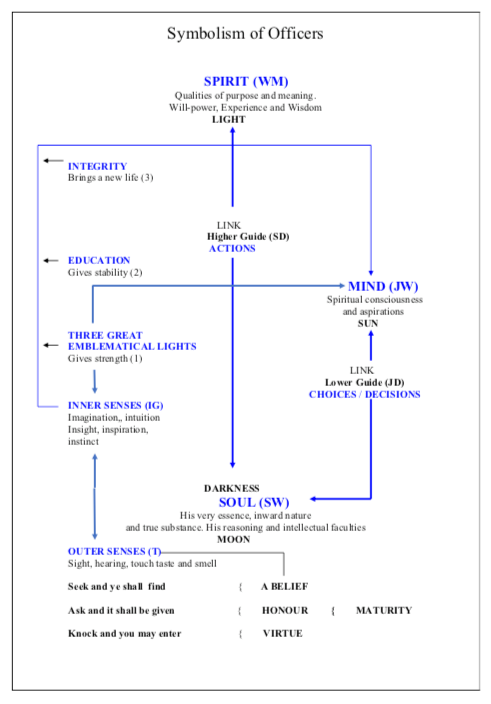
The purpose of life, according to Denis Waitley, is to be happy. “Happiness cannot be travelled to, owned, earned, worn or consumed. Happiness is the spiritual experience of living every minute with love grace and gratitude.”
Valerie Soleil, BA, LL.B in her article in Life Advancer dated February 16th, 2016, stated that:
There are 7 personal qualities to live a life of purpose. In the qualities she could easily be writing about Freemasonry.
Soleil’s 7 qualities are:
1. Service to others.
When a Freemason talks about “Brotherly Love” he is reminded of his commitment to his service to others as stated in the Charge after Initiation, “…rendering him every kind office which justice and mercy may require…”
2. Finding your passion.
A Freemason’s “passion” is “brotherly love, relief and truth” He is dedicated to be the best person he can be in all areas of his life “to his God, to his neighbour and to himself.”
3. Maintain personal integrity.
In the maintenance of personal integrity a Freemason looks inwards to his personal “Truth”.
Knowing himself and striving to be virtuous in his thoughts and action.
In recognising and acting upon anything that may take him away from that virtuous path laid out by his faith in the VSL.
4. Find heroes who inspire.
The allegories within the ceremonies and within the VSL inspire heroic personal feats in order to achieve those Masonic goals.
5. Keep a sense of humour.
Seeking calmness, peace and happiness within himself is a Freemasons goal in the knowing of himself. His own personal “Truth”.
The striving of happiness and being happy in his attitude will affect his behaviour and will bring out the good humour and happiness in himself and others.
6. Being non-judgemental.
Everyone fights their own battles within themselves. Freemason’s are taught “….to relieve (a neighbour’s) necessities and sooth(ing) his afflictions and by doing to him as in similar cases you would wish he would do to you.”
7. Be a life-long learner.
Freemasonry is a life long journey in which Masons are encouraged to make a daily advancement in Masonic knowledge.
The knowledge of themselves. Reflecting on their achievements and setting small achievable goals in order to be the best person they can be and an eventual search for “Spiritual Enlightenment”.

Tatsuo Tabata, of the Osaka Prefecture University, cites the religious scholar Thomas Moore in his interview with Oprah (Winfrey), “The Spirit is that part of us that wants more. That wants to transcend. Wants to grow. Wants to move into a better world. Wants to improve ourselves”.
Question asked; “What is the difference between soul and spirit?”
Let us apply those wonderful extracts to W. L. Wilmshurst and his book “The Meaning of Masonry” in examining the role of the Worshipful Master more closely.
Your Spirit, that quality of purpose that drives you and works in conjunction with your Soul, that part of you which holds your deepest feelings, and your Mind, your spiritual consciousness which inspires virtue and virtuous behaviour.
When a Mason is installed as WM he has to give his unqualified ascent to three questions:
Question 1
You agree to be a good Man and true, and strictly to obey the moral law?
I would add the word “continue” to be a good man and true as your character has already been established prior to your initiation.
The moral Law is written in the Holy Book of your acknowledged faith and in which you have placed your trust. It is also in the principles of the Square and Compasses, together those “Three Great Lights” that guide you, inspire you, and give you a sense of purpose throughout your life.
In the charge after initiation you are informed of your duty to God;
“by never mentioning His name but with awe and reverence which are due from the creature to his Creator, by imploring his aid in all your lawful undertakings, and by looking up to Him in every emergency for comfort and support”.
Question 2
You are to be a peaceable subject and cheerfully conform to the laws of the country in which you reside?
The charge after initiation specifically covers this point:
“As a citizen of the world, I am to enjoin you to be exemplary in the discharge of your civil duties, by never proposing or countenancing any act that may have a tendency to subvert the peace and good order of society, by paying due obedience to the laws of any State which may for the time become the place of your residence or afford you its protection,…”
Question 3
You promise that no Visitor shall be received into your Lodge without due examination and producing the proper vouchers of his having been initiated in a regular Lodge.?
Here you are to look at people you receive closely into your life.
Are they like minded and more importantly do they hold the same values as yourself?
Surround yourself with positive thinkers who value brotherly / sisterly love, charitable actions and are true to themselves.
The charge after initiation states the duties you have to your neighbour, mankind in general:
“by acting with him on the square”, that is to say by exercising the “purest principles of piety and virtue”.
These questions set the tone and the purpose of your life. In order to achieve that purpose, happiness, there are two duties required of you:
Duty 1
As the sun rises in the east to open and enliven the day so the WM is placed in the East.
As you start your day so your “Spirit” sets your agenda, your purpose.
Your “Spirit”, that force which “wants you to grow, to move into a better world”. It is the driver to be a better person. A better person before your God, and before mankind.
Duty 2
To open the Lodge To employ and instruct the brethren in Freemasonry.
To open yourself up and help others to be better people. Acknowledge who you are, your values and your purpose in life. Lead by example and share your happiness.
Action
At the start of the day set one achievable objective that will take a step towards making you a better person:
![]()
A journey of a thousand miles
begins with a single step..
– Lao Tzu
Conclusion
Thus your “Spirit” works in conjunction with your “Soul” and your “Mind” in communication with your inner and outer senses, to produce the best person you can be. The search for your “Truth” and spiritual enlightenment.
The aim of a Freemason is to be happy in himself and spread that happiness to those around him.
David Chalmers writing in The Conversation, June 6th, 2019, explains his theory on consciousness and particularly Awaking Experiences;
“when human awareness intensifies and expands we experience a sense of oneness with other human beings, nature and the world as a whole”
![]()
Brethren, such is Freemasonry:
“Brotherly Love, Relief and Truth.”
Footnotes
References
The Meaning of Masonry – W. L. Wilmshurst. 1920
Life Advancer. www.lifeadvancer.com – Feb. 16th, 2016, Valerie Soleil BA. LL.B
Psychology of Success – Denis Waitley. 2009
What is the difference between soul and spirit? – www.researchgate.net , Tatsuo Tabata
You Tube – Super Soul Conversations – Oprah Winfrey and Thomas Moore
The Conversation – Awaking Experiences June 6th 2019 David Chalmers
Tao Te Jing (Chapter 64) Lao Tzu (Laozi). 4th Century BC
Betari’s Box Theory National Police Public Order Training Curriculum, Guidance for Trainers, 2016
Lodge of Union No. 38 (UGLE) Ritual Book.
Article by: Stephen J. Goulding
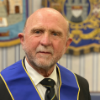
Stephen was initiated into Freemasonry in 1978 in Tylney Lodge No. 5856 (UGLE). He was Master in 1989 & 2004.
He was Master of the Lodge of Union 38 (UGLE) in 2018. He is also a PZ in the Holy Royal Arch and PM in the Mark Degree.
Stephen served 30 years in the Metropolitan Police Service (London, England) before going into education in 2000, where he became a college lecturer and a mentor for both the college and the University of Greenwich (London, England). Now retired, he teaches Tai Chi and Qigong in the community.
Facebook: Steve Goulding-Tai Chi West Sussex–Chi at Chi
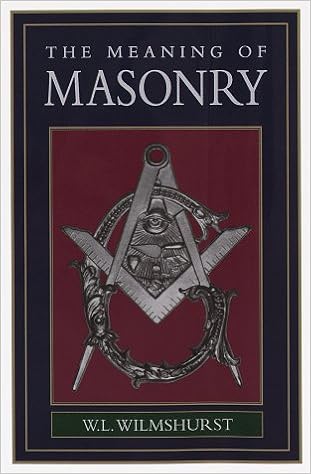
The Meaning of Masonry
By W.L. WILMSHURST
Although the Freemasons number over six million members worldwide, they are a very secretive organization. the general public today thinks of them as a social fraternity like the Rotary Club, but that is hardly the whole truth.
By mysterious coincidence, it seems, many Masons have been major figures in modern history. many of the Founding Fathers of the United States—including George Washington, Thomas Jefferson, Benjamin Franklin, and Paul Revere—were Freemasons.
Giuseppe Garibaldi, the Italian freedom fighter, was also one, as were the composers Franz Joseph Haydn and Wolfgang Amadeus Mozart and writers François Marie Arouet de Voltaire and Johann Wolfgang von Goethe.
The Meaning of Masonry explores the beliefs behind the order, its cryptic rites and symbols, and uncovers its ultimate purpose.
Recent Articles: officers of the lodge
 Tyler: The significance as the protector of the lodge's secrets and harmony. Tasked with guarding the entrance, the Tyler symbolizes our spiritual and moral boundaries, ensuring only worthy candidates are allowed into the sacred space of Freemasonry's teachings and rituals. |
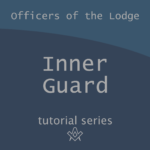 Officers of the Lodge - Inner Guard Inner Guard: Is the first line of defence against unworthy intruders, the Inner Guard represents our inner conscience and the personal responsibility we have to safeguard the integrity of our spiritual journey. |
 Officers of the Lodge - Deacons Deacons: The messengers and intermediaries within the lodge. Representing the communication between the material and the spiritual realms, Deacons symbolize the importance of transmitting knowledge and wisdom as we strive for personal growth and enlightenment on our Masonic journey. |
 Officers of the Lodge - Junior Warden Junior Warden: Ensuring the well-being of the brethren during the lodge's hours of refreshment. Representing the virtue of temperance, the Junior Warden reminds us to find balance in our lives and cultivate moral discipline in our pursuit of truth. |
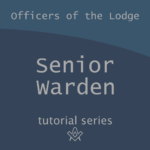 Officers of the Lodge - Senior Warden Senior Warden: embodies the essence of strength and stability within the lodge. As the pillar of support for the Worshipful Master, the Senior Warden symbolizes the fortitude required on our spiritual journey, inspiring us to persevere in the face of adversity |
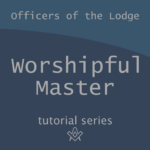 Officers of the Lodge - Worshipful Master Worshipful Master: the highest-ranking officer in the lodge, is the embodiment of wisdom and authority. The Worshipful Master guides the brethren on their spiritual path, representing the divine light that illuminates the Masonic quest for knowledge and self-discovery. |
masonic knowledge
to be a better citizen of the world
share the square with two brothers

click image to open email app on mobile device


